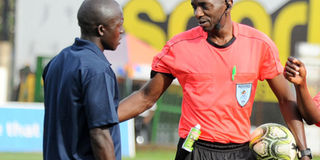Here is why fight against match-fixing is staggering

Referee Emma Kiweewa lends an ear to a complaint from a Bright Stars official earlier this term. PHOTO BY EDDIE CHICCO
What you need to know:
VICIOUS CYCLE. Fufa will undoubtedly be ostentatious with this outcome, parading it as something of a major deterrent. Most referees are, however, careful enough not to leave any paper-like trail behind.
Onduparaka football club’s recent revelation that it flatly turned down a $10,000 (about Shs37m) bribe to fix a topflight league match with Tooro United has seen public indifference about match-fixing tip into worry and even fear.
The Arua-based club has since its establishment in October of 2011 been known for its principled, unrelenting and sometimes caustic voice even while facing growing pressures on several fronts.
These traits are not about to fade. A statement the club put out last weekend showed an admirable desire to draw a line beneath one of Ugandan football’s taboo subjects.
The statement was promptly understood as a call to arms to defend against vile attempts to dishonestly determine the outcome of matches. As indeed it should!
Whispers in corridors have only served to create a vague awareness of the beautiful game’s vulnerabilities to match-fixing in this part of the world. Onduparaka’s statement humanises the problem and above all gives us an opportunity to crystallise around a specific threat. Huge challenges remain amid the belated recognition, not least the diminishing appeal for Fufa to decisively take on match-fixing rackets.
The long periods of stasis have led observers to the conclusion that there is no political will to strike a blow against match-fixing. Fufa has not helped itself through the vast bulk of its decisions. The football governing body has twice (2003 and 2018) gamely tried to institute a probe into choreographed acts of real farce. While it has been heartening to see the thoughts of a wide swath of football stakeholders picked, the fact the probe reports continue to gather dust on the shelf in Mengo is puzzling to say the least.
Even more puzzling is the fact that Fufa has derived a sadistic delight in tightening - even cutting - the purse strings of referees calling matches in its top two tier leagues.
There used to be destructive rows over the arrears Fufa owed the referees. The acrimonious quarrels have largely died down not because the deadlock was resolved as much as referees have allegedly become creative in making ends meet. One of them was last year outed shamelessly asking for a bribe to predetermine a match in the University Football League. Emmanuel Kiweewa has has since been slapped with a five-year ban.
Fufa will undoubtedly be ostentatious with this outcome, parading it as something of a major deterrent. Most referees are, however, careful enough not to leave a paper trail behind. Cognisant of the fact that it does not have the smarts to get on top of such sophisticated misdeeds, Fufa should move to build capacity in that regard.
Most importantly, though, the local football body should confound its critics by not letting the ‘Onduparaka moment’ pass it by. Sports betting risks creating an exhausting mix and taking Ugandan football down the rabbit hole. All this will happen if the powers that be do not make it their business to do something in an open and transparent manner.
News that Fufa recently interrogated Onduparaka’s chief executive should not make us swell with hope. As night follows day, expect there to be a paucity of information about this latest investigation into match-fixing.
Fufa will mumble something about facing a welter of challenges then life will go on.
Something else will come up and dominate headlines as the news cycle slides from one issue to the next.




